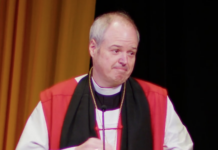The House of Lords on 18 March 2020 debated the government’s proposed Budget Statement submitted by the Chancellor of the Exchequer. The Archbishop of Canterbury, the Most Rev. Just Welby raised the question of how “social morality” might direct state spending
The Archbishop of Canterbury: My Lords, a Budget is social morality in numbers. Whatever we say we believe about the dignity of human beings and about the existence or otherwise of society, the reality of our belief is demonstrated by the way we act, and especially by the way we act with money. The crisis through which we are passing will change this nation in deep and unpredictable ways, as the noble Lord, Lord Oates, has just said. Like a nuclear explosion, the initial impact is colossal, but the fallout lasts for years and will shape us in ways we cannot even begin to predict at the moment.
The Budget and the extra package announced yesterday must be both adequate in amount and sufficient in their aims to ensure that this country emerges confident from overcoming the virus—positively better than before it began. We will overcome the virus. The noble Lord, Lord Tunnicliffe, commented that small groups all over the country are showing fresh signs of community spirit and collaboration, and it is from those small groups, through to the large-scale government measures, that things will change.
During a crisis, keeping the long-term direction is as important as tackling the short-term problem. The enormous package of short-term measures is, by its very size, sufficient to raise hope, and for that it is welcome. Fifteen per cent of GDP is a ‘war Budget’ commitment. The obvious questions, which have already been raised, are: how will it be distributed and how will it be used effectively? If we are to put confidence as the aim and people at the centre, the distribution and the impact must be both swift enough and imaginative enough to maintain confidence right across the economy, not only in the big cities with their own self-sustaining economies, but in the myriad towns and smaller communities across the country.
For many of them, there has been decline for many years, particularly, as we all know, those on the coast and in remote areas. Covid-19 may well be the last straw for some. Even exceptionally beautiful and normally tourist-filled cities, such as Canterbury, with good pedestrianised city centres full of bars and restaurants, and with major chains and everything in between based there, have seen this decline. In the past 12 months in Canterbury, Debenhams has closed and the number of vacant stores is noticeably larger. This could be repeated across the country. Shutting down the hospitality industry, necessary though it is, will empty the city centre. The cathedral, in which I should probably declare an interest, with its 300 employees, is one of the largest private sector employers in east Kent. It has apprentices, people with unusual skills and many other workers, but it depends from week to week and month to month on the income from tourism. Its solvency protects much of the local economy. Its 2 million visitors a year are at the beating heart of what makes the east Kent economy work. The same could be said about so many other places, from Durham south. A local economy is people, and an ecosystem as well. It is a complex structure, and losing one bit leads to overall decline. The package that has been announced and the Budget must be used with the vision of preserving the most fragile parts of the system, or we will lose all.
The use of these sums, so enormous and unprecedented, must be seen as being based in a clear moral and ethical structure, aimed at enabling those excluded by lack of adequate training and skills, the misfortune of being in declining industries, social change or other reasons to renew aspiration and to have jobs and secure homes in mutually supportive communities. We see the importance of community at this time.
It has been said that we should be especially concerned about the five-week gap in the payment of universal credit. That remains a significant problem in many areas. Thanks to the hoarding and panic buying that has been going on, food banks are desperately short of supplies for those who need them. They do not need money; they need the physical goods to give out, but they are not available. They are most needed when people move on to universal credit; 45% or so of those who come to food banks come because of problems with credit.
Free school meals have hardly been touched on. We will hear a Statement later today which may speak, as in Wales, of the closure of schools. For many children in the most deprived areas, school is where they get not just education but food. That needs to be addressed. What possibilities can the Government offer to enable free school meals, for instance, to continue during the gap? There has been talk about the need for provision for those who are self-employed and of statutory sick pay; I shall not repeat it.
To be moral and ethical, there has to be a vision on a scale with the spending, a vision that recovers “us” and “we” from the era of “I” and “me”—in short, a vision to recreate the notion and reality of society. That vision requires the mobilisation of not only the economy but of partnerships across society. In the Church of England, with 1 million children in schools, we are already planning and thinking about what education should look like to give abundant life. The phrase “abundant life” comes from the words of Christ. It marks the deeply embedded Christian tradition in our society to do with human flourishing, but human beings are responsible for making it happen. We are going to see huge change. It can be towards what we choose, or it will be what the strong make it.



